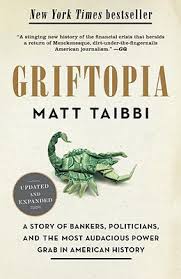|

Griftopia
Updated and expanded edition
Matt Taibbi
Spiegel & Grau Trade Paperbacks
2011
296 pp.
Matt Tabbi’s Griftopia presents a literary quandary: what makes a book “good,” and is there a difference between calling a book good and saying a book is worth reading? In the cliché notion of the phrase “worth [doing said action],” we typically mean the end justifies the work needed to get to that point; it does not inherently mean that the work itself is an enjoyable venture. Yet, in regards to literature, this cliché often morphs into something else, something more akin to Guilty Pleasures or Academic Highbrow Complexity or something in between that really means, “the reading of this is, in some capacity, a chore, either on one’s patience and understanding or on one’s notion of Literary Self (should you be a literature snob, or conceive of yourself as one).” Is a complex, difficult book inherently good? No. Is a sometimes badly written book inherently bad? Yes. But that doesn’t mean it’s not worth reading.
Griftopia chronicles the collusion between Wall Street banks and the U.S. government to deregulate the markets; in the process, the banks have essentially destroyed the non “1%,” engaging in, if not outright illegal, questionable practices, putting at risk a mind-boggling amount of other people’s money, while creating staggering profits for themselves. If you had a pension plan from your employer in 2008, your pension was in all likelihood destroyed by these practices, and, a domino effect has continued through present day.
As a writer, Taibbi relies heavily on the Hunter S. Thompson school of journalism, unsurprising as Taibbi has worked at Rolling Stone for a number of years in various capacities. He does his best to “dumb-down” complex financial terms and procedures for the average reader, which is helpful . However, when he goes off the rails, his writing can’t hold up to the Thompson Formula; Hunter ranting meant the reader was going to discover something vital hidden inside the supposed insanity. Here, Taibbi’s ranting, while often justified in a moral/ethical sense, relies on shock more than revelation; in regards to the Tea Party’s misplaced idealism he writes:
they see absolutely nothing weird in launching a revolution based upon the ravings of a guy who’s basically a half-baked PR stooge shoveling propaganda coal for bloodsucking transnational behemoths like JPMorgan Chase and Goldman Sachs.
There’s a lot happening in that sentence. At its simplest, we have rebels, stoners, vampires, and something called “propaganda coal,” which taken to its (il)logical conclusion means the propaganda razes mountains and causes pollution. The anger has every right to exist; the pop culture/low-brow, on the other hand, turns some of this anger into less an indictment and more a high schooler screaming at the night for being too dark. Things like this happen way too much in Griftopia for it to be considered good.
And that is rather disappointing. Emotionally, Griftopia, is a classic, mandatory reading for understanding the dismantling of the American financial system and, therefore, a good chunk of what we call our democracy. On the other hand, “good,” as we understand it in relation to literature, has roots in subjectivity, taste, education, and the canon, a rhizomatic structure of enduring and interlinking qualifications entirely dependent on who you are. The difference, then, between calling a book good and saying a book is worth reading is the way in which that specific piece of literature relates to you in both emotional and Literary Rational scales. Literary Rational says the writing often can’t live up to the anger being expressed, possibly because the amount of anger needed to make changes to this system is unfathomable; that might just be the best endorsement one can make.
--Joel Lee
Joel Lee is a graduate of the NEOMFA program. He has had some poetry and nonfiction published, including the AWP Intro Journals award piece, "Self: A Musical," in the College of Wooster's Artful Dodge. Other writing appears on a self-serving blog, I Remember Cassettes, should you find yourself bored on the internet. Along with his wife, their gaggle of pets, and a whole host of random wildlife, he lives in a log cabin in Amish country, where he works on developing acceptable facial hair.
Also by Joel Lee:
Review of Luminarium by Alex Shakar
|
|

